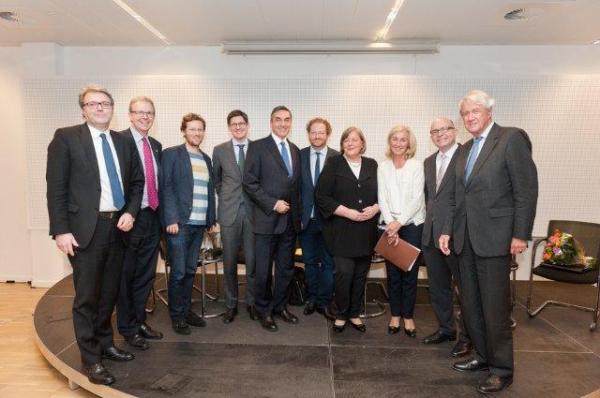In this session, you can find an overview of events, conferences and meetings the EDPS organises or participates in. Please check our speaking engagements policy if you want to invite us to speak during an event.
- Press & Publications
- Events
In this session, you can find an overview of events, conferences and meetings the EDPS organises or participates in. Please check our speaking engagements policy if you want to invite us to speak during an event.

In a ranking of importance to people’s daily lives, the smartphone surged to the top, falling below only the Internet and personal hygiene. Given the sensitive data stored on smartphones, from pictures and contacts information to bank details, PINs, and medical information, special care should be given to securing them against any harm, both online (data theft) and offline (stolen).
At this exclusive conference, the EDPS will outline risks to your personal data and how you can better protect your data on your smart devices. The event will be streamed live and everyone can get involved in the conversation with the Supervisors and panellists through Twitter #EDPD2015.

CPDP offers the cutting edge in legal, regulatory, academic and technological development in privacy and data protection. Within an atmosphere of independence and mutual respect, CPDP gathers academics, lawyers, practitioners, policy-makers, computer scientists and civil society from all over the world to exchange ideas and discuss the latest emerging issues and trends.
This unique multidisciplinary formula has served to make CPDP one of the leading data protection and privacy conferences in Europe and around the world. Organised with the support of the EDPS, this year's panels will focus on key issues that cover all current debates: the data protection reform in the EU: European and Global developments; mobility (mobile technologies, wearable technologies, border surveillance); EU-US developments concerning the regulation of government surveillance; e-health; love and lust in the digital age; internet governance and privacy; and much, much more.
For more information and registration: www.cpdpconferences.org
Follow CPDP on Facebook (CPDPconferencesBrussels) and Twitter (@cpdpconferences).

The recent rulings of the European Court of Justice concerning data retention and search engines (Google Spain) illustrate the increasing relevance of the fundamental rights to privacy and to the protection of personal data in the context of new information services and data transfers in a global world.
Against the background of rapid technological developments and the growing reality of ubiquitous surveillance of personal data by private and public entities alike, the European Union is striving for new rules to effectively protect personal data also in the 21st century.
Andrea Voβhoff, the German Federal Commissioner for Data Protection and Freedom of Information, and Peter Hustinx, the European Data Protection Supervisor, have the pleasure to invite high-level representatives of all institutional and political actors involved to debate outstanding issues and necessary steps to be taken to bring the reform of EU data protection law to a timely and successful conclusion.
EU Data Protection Reform: Close to the finishing line


The first IPEN workshop will take place in Berlin.The workshop is designed to be a practical approach to identify privacy gaps in existing technology and develop useful solutions. further information: draft agenda and speakers list.

The Council of Europe and the French Data Protection Authority, Commission Nationale de l'Informatique et des Libertés (CNIL), will host the 2014 European Conference of Data Protection Authorities, in Strasbourg.
This year, the Conference will focus on cooperation and explore how national data protection authorities can work together to produce more effective policies and responses. This theme aims to address the challenges posed by the exchange of personal data on a global level.
The event is open to members of accredited data protection authorities and observers. It will be an opportunity for delegates to share their ideas and experience on how best to strengthen the fundamental right to data protection.